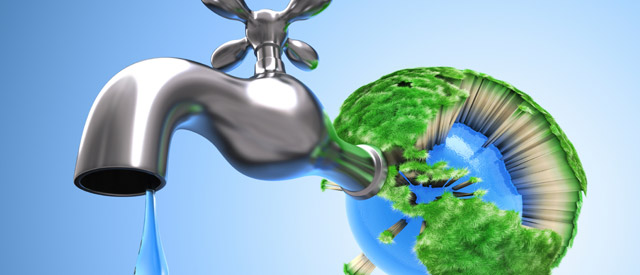 Tackling fresh-water shortage problems around the Mediterranean
Tackling fresh-water shortage problems around the Mediterranean
Water is the most vital resource for human life. However, urbanisation, extensive irrigation and variations in rainfall patterns due to global climate change have led to serious water scarcity in many areas of the world. A European research project has developed a transport system consisting of water-bags and tugboats to bring fresh water to the hardest-hit coastal and island regions around the Mediterranean. Areas under increasing pressure from water scarcity, particularly in the summer months, include small cities and islands along the coasts of Spain, Greece and Italy, among others.
It is estimated that 50 million European citizens – 18% of Europe’s population – living in coastal cities and island communities around the Mediterranean are affected by water-stress problems. According to the European Environment Agency (EEA), 16 to 44 million additional people will suffer water scarcity in Southern Europe by 2070. The EU has taken a leading role in tackling water scarcity both on a European and global scale.
The Mediterranean region is a major concern. Coastal and island communities are facing serious water shortages, made worse by the annual influx of tourists.
To meet growing demand for water in this region, an innovative, flexible and affordable solution is needed to transport large quantities of fresh water from ‘water-rich’ to ‘water-poor’ areas.
The EU-funded Refresh project has come up with such a solution. The research team has developed and successfully tested a flexible and cost-effective system to transport fresh water by sea using flexible plastic containers – water-bags – towed by a tugboat.
In a test carried out in November 2012, the Refresh prototype water-bag was successfully towed for 16 nautical miles on a voyage back and forth through the Gulf of Souda, off the island of Crete. The test proved that both the bag and towing system could deal with the stresses and strains of a number of seaborne manoeuvres.
Bag it and drag it!
The Refresh water-bag is a composite of modules which can combine to form a 20m-long, 4m-wide container capable of carrying 200 tonnes of fresh water. Each water-bag is equipped with integrated sensors, powered by a solar cell located on the flat top of the container. A fibre-optic grid monitors any deformations in the bag (signs of tearing or folding) during its sea voyage. A water-quality sensor to assess water purity has been tested in a laboratory with the intention of being fitted to water-bags in the future to ensure safe and clean delivery after transit.
The primary application of the Refresh water-bag and delivery system will be to supply fresh water to Mediterranean coastal cities and islands with less than 300 000 inhabitants – covering about 45 million European citizens. Around 65% of the communities in these coastal cities and islands double in size during the tourist season.
With the initial investment focused mainly on constructing the water-bag and renting or purchasing a tugboat, the Refresh approach is more cost effective than using tanker ships – where fresh water is priced around EUR 14/m3 – or huge infrastructures, such as pipelines or desalination plants. This makes it an attractive proposition for local small and medium-sized enterprises (SMEs).
“The project’s SME partners all share ownership rights over the system concept so they will either benefit from manufacturing and selling the water-bag system to third parties or from directly operating the water-delivery service by setting up a joint venture,” says Samuele Ambrosetti, leading engineer on the Refresh project. “Local operators will have the possibility of buying or renting the water-bags from the consortium or of procuring the ‘turnkey’ water-transport service.”
The system does not require permanent onshore or near-shore infrastructures and the running costs are kept low thanks to the use of tugboats. The final price for the water will depend on the distance it is shipped and on the payload. Preliminary calculations indicate water costs of around two to five euros per cubic metre for intra-Mediterranean voyages, where each water-bag module is 5 metres long and 4 metres and holds 62.83 cubic metres of water (with total water costs between EUR 126.66 - 314.15 for such a journey), and between five and ten euros per cubic metre for oceanic voyages. The dimensions of the oceanic modules have yet to be defined.
The Refresh system is also environmentally friendly compared to the alternatives. The supply of fresh water to locations experiencing shortages will help take the pressure off aquifers and reservoirs, while CO2 emissions will be lower thanks to efficient transport options.
“We have received considerable interest from stakeholders in the Mediterranean and Persian Gulf area, both to acquire our system on a licence basis and to form partnerships to deliver water,” says Mr Ambrosetti. “Contacts are ongoing with potential commercial partners in the USA and Middle East.”
The Refresh team has also applied for funding for a follow-up demonstration project within the EU’s Seventh Framework Programme for Research (FP7) – the Union's main instrument for funding research and innovation to foster growth and jobs. Further EU support would enable Refresh to scale up the concept for commercial applications over medium- to long-distance routes.
Project details:
- Project acronym: Refresh - http://www.refresh-fp7.eu/
- Participants: Greece (Coordinator), Czech Republic, Spain, Italy
- Project FP7 262494
- Total costs: €1 300 920
- EU contribution: €945 161
- Duration: November 2010 - October 2012
| Contact information | n/a |
|---|---|
| News type | Inbrief |
| File link |
http://ec.europa.eu/research/infocentre/article_en.cfm?id=/research/headlines/news/article_13_04_22_en.html&item=Infocentre&artid=29733 |
| Source of information | EC DG Research & Innovation |
| Keyword(s) | water shortage, water scarcity |
| Subject(s) | HYDRAULICS - HYDROLOGY , INFORMATION - COMPUTER SCIENCES , METHTODOLOGY - STATISTICS - DECISION AID , POLICY-WATER POLICY AND WATER MANAGEMENT , RISKS AND CLIMATOLOGY , WATER DEMAND |
| Relation | http://www.emwis.net/initiatives/fol060732/tackling-fresh-water-shortage-problems-around-mediterranean/ |
| Geographical coverage | Greece,Italy,Spain,Czech Republic |
| News date | 29/04/2013 |
| Working language(s) | ENGLISH |
 you are not logged in
you are not logged in





